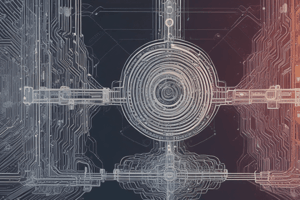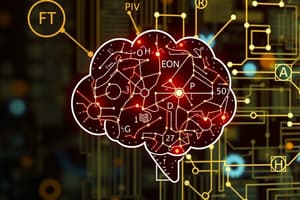Podcast
Questions and Answers
What term describes the tendency to favor information that confirms pre-existing beliefs?
What term describes the tendency to favor information that confirms pre-existing beliefs?
- Interpersonal Relationships
- Confirmation Bias (correct)
- Information Overload
- Personal Efficacy
Which consequence of fake news can be considered a long-term effect?
Which consequence of fake news can be considered a long-term effect?
- Political Decisions
- Business Impact
- Peace and Order
- Chilling Effect (correct)
What factor can lead to people becoming more likely to believe in misinformation?
What factor can lead to people becoming more likely to believe in misinformation?
- Higher social media news use (correct)
- Participating in discussions
- Access to multiple sources
- Active news engagement
Which is NOT a reason for informational apathy when confronting misinformation?
Which is NOT a reason for informational apathy when confronting misinformation?
What type of source is least likely to be trusted when evaluating information?
What type of source is least likely to be trusted when evaluating information?
What is the role of abstraction in computational thinking?
What is the role of abstraction in computational thinking?
Which of the following best defines algorithms in computational thinking?
Which of the following best defines algorithms in computational thinking?
In the context of computational thinking, how does abstraction help in bioinformatics?
In the context of computational thinking, how does abstraction help in bioinformatics?
What is an example of an algorithmic concept mentioned in the content?
What is an example of an algorithmic concept mentioned in the content?
How can abstraction make the structure of cellular information more understandable?
How can abstraction make the structure of cellular information more understandable?
Which statement about algorithms is TRUE?
Which statement about algorithms is TRUE?
What is one of the primary benefits of using pseudocode?
What is one of the primary benefits of using pseudocode?
In computational thinking, which domain helps analyze large data sets such as genomics and proteomics?
In computational thinking, which domain helps analyze large data sets such as genomics and proteomics?
What is the primary benefit of decomposition in problem-solving?
What is the primary benefit of decomposition in problem-solving?
Which of the following is NOT a characteristic of patterns in data?
Which of the following is NOT a characteristic of patterns in data?
What is a key principle of Zero Trust in cybersecurity?
What is a key principle of Zero Trust in cybersecurity?
In what ways can subproblems be addressed in the decomposition process?
In what ways can subproblems be addressed in the decomposition process?
Which of the following describes a challenge in defending against cyber attacks?
Which of the following describes a challenge in defending against cyber attacks?
How does recognizing patterns affect the problem-solving process?
How does recognizing patterns affect the problem-solving process?
Which statement best describes the relationship between decomposition and complexity?
Which statement best describes the relationship between decomposition and complexity?
In phishing prevention, what is a recommended action before clicking a hyperlink?
In phishing prevention, what is a recommended action before clicking a hyperlink?
What is the minimum recommended length for a strong password?
What is the minimum recommended length for a strong password?
Which computer science manifestation is NOT associated with pattern recognition?
Which computer science manifestation is NOT associated with pattern recognition?
Which approach focuses on having multiple lines of defense in cybersecurity?
Which approach focuses on having multiple lines of defense in cybersecurity?
What can be a consequence of failing to decompose a complex problem?
What can be a consequence of failing to decompose a complex problem?
Which domain benefits from the application of patterns and decomposition?
Which domain benefits from the application of patterns and decomposition?
What should be avoided when creating a strong password?
What should be avoided when creating a strong password?
What should be done when an email is suspected to be a phishing attempt?
What should be done when an email is suspected to be a phishing attempt?
What is a crucial component of Cyber Crisis Management?
What is a crucial component of Cyber Crisis Management?
What aspect of authentication concerns the reliability of the source?
What aspect of authentication concerns the reliability of the source?
Which of the following is an example of intentional interpersonal authentication?
Which of the following is an example of intentional interpersonal authentication?
What is a key motivation for individuals to authenticate information?
What is a key motivation for individuals to authenticate information?
Under POFMA, what is one primary purpose of the act in Singapore?
Under POFMA, what is one primary purpose of the act in Singapore?
Which consequence of authentication refers to the reinforcement of dependency among institutions?
Which consequence of authentication refers to the reinforcement of dependency among institutions?
What is one of the strategies for authentication mentioned in the content?
What is one of the strategies for authentication mentioned in the content?
Which of the following actions by tech companies aims to support the authenticity of online content?
Which of the following actions by tech companies aims to support the authenticity of online content?
Which of the following describes a self-authentication method?
Which of the following describes a self-authentication method?
Flashcards are hidden until you start studying
Study Notes
Computational Thinking Competencies
- Computational thinking involves using your mind to consider calculations and order.
- Computational thinking competencies are important skills needed to do a job.
- Abstraction
- Simplifies things by identifying and utilizing the structure of concepts or main ideas.
- Focuses on important information without emphasizing details.
- Biological Domain
- Bioinformatics combines different fields of study like computer sciences, molecular biology, and engineering.
- Analyzes large amounts of data in genomics and proteomics.
- Computer Science Manifestations
- Pseudocode provides an informal description of computer program execution steps.
- Human Genomes
- Structure of a cell is complex and difficult for humans to comprehend.
- Abstraction through labeling, lettering, shaping, coloring, numbering, etc., simplifies cell representation for better understanding.
- Algorithms
- Follow, identify, use, and create ordered sets of instructions.
- Arranges things in ascending (1 to 5) or descending (5 to 1) order.
- Biological Domain
- Involves transcription, translation, gene function prediction, and protein function prediction.
- Computer Science Manifestations
- Employs IF ELSE statements.
- Considers algorithm efficiency.
- Decomposition
- Breaks down data, processes, or problems into smaller manageable components to solve a problem.
- Each subproblem is examined or solved individually for a simpler approach.
- Also known as divide-and-conquer to synthesize the final solution.
- Biological Domain
- Biological decomposers include fungi and bacteria.
- Computer Science Manifestations
- Uses functions and factorials.
- Pattern Recognition
- Observes patterns, trends, and regularities in data.
- A pattern is a discernible regularity where elements repeat predictably.
- Involves finding similarities or patterns between small, decomposed problems, which helps solve complex problems efficiently.
- Biological Domain
- Includes gene finding, biomarkers, and protein synthesis.
- Computer Science Manifestations
- Employs machine learning, artificial intelligence, probability, and statistics.
Cybersecurity
- Phishing
- Verify the sender of the email.
- Practice caution before clicking on hyperlinks and manually type the correct address to ensure website authenticity.
- Look for the lock icon in the address bar to ensure the website starts with https.
- Report suspicious emails to the appropriate authority.
- Delete the email and avoid forwarding it.
- CIA
- Confidentiality: Protect personal information and share only what is necessary.
- Integrity: Practice cyber hygiene and beware of fake sources of information.
- Availability: Prevent getting locked out of devices, as your actions can affect others.
- Strong Passwords
- At least 8 characters long.
- Includes numbers, symbols, upper and lowercase letters.
- Use uncommon and nonstandard words or create a password from a sentence meaningful to you.
- Avoid personal information that people know about you.
- Use different passwords for different accounts.
- Change passwords regularly.
- Use two-factor authentication or multi-factor authentication (MFA) through mobile numbers, email addresses, or authentication apps.
- Data Security
- Data can exist in physical and digital forms.
- Data can belong to individuals or organizations.
- Levels of Data Security
- Feedback:
- Receiver:
- Confirmation bias
- Motivations
- Corrections
- Context:
- Information overload
- Instability
- Different Sources
- Original Source
- Immediate Source
- Invisible Source
- Trusted Source
- Disregarded Source
- Message Characteristics
- Plausibility
- Mentions Experts
- Conversation Tone
- Stirs Emotions
- Asks for call to actions (Forwarding the message)?
- Channels where information flows
- Popularity cues
- Reliance
- Lack of gatekeeping
- Information overload
- Higher social media news use = Higher likelihood to believe in fake news.
- Avoiding news = More likely to believe in misinformation.
- Confirmation Bias: Information that aligns with our existing beliefs.
- Informational Apathy
- Issue Relevance: Does not concern me.
- Interpersonal relationships: Do not want to offend family/friends.
- Personal Efficacy: There is no point in reasoning as people already believe.
- Consequences of Fake News
- Short Term:
- Political decisions
- Business
- Peace and order
- Reputation
- Long Term:
- Devaluation of information
- Erosion of trust in institutions
- Larger social divisions
- Chilling effect
- Short Term:
- What Can We Do?
- Individuals Authentication
- Internal Acts of Authentication
- The Self: We are old enough to judge and think (experience).
- The Source: Is the source reliable?
- The Message: Check the tone and see if it’s polemical or deliberately misleading to arouse emotions.
- The Message Cues: If there are more likes, shares, comments, etc.
- External Acts of Authentication
- Incidental & Interpersonal: By chance discussing with family or friends.
- Incidental & Institutional: Waiting for the follow-up news to confirm it.
- Intentional & Interpersonal: Asking a reliable group to verify.
- Intentional & Institutional: Googling the information to check.
- Social Process
- Motivations for authenticating:
- Self-image (show that you don’t have questionable beliefs)
- Group cohesion
- Strategies of authentication:
- Group beliefs; “deep stories”
- Source affiliation
- Sharing as authenticating
- Consequences of authentication:
- Institutionalisation of Interdependence
- Ritualisation of collective authentication
- Motivations for authenticating:
- Internal Acts of Authentication
- Governments Authentication
- POFMA (Protection from Online Falsehoods and Manipulation Act):
- An Act to prevent false statements circulating in Singapore.
- Suppress support for and counteract the effects of such communication.
- Safeguard against the use of online accounts for false communication and information manipulation.
- Enable measures to enhance transparency of online political advertisements.
- POFMA (Protection from Online Falsehoods and Manipulation Act):
- Tech Companies Authentication
- Intervention (pressure by the public)
- Support third-party fact checkers and journalists.
- Promote media literacy among users.
- Reduce financial incentives for content producers.
- Implement new features to flag content.
- Delete posts and remove accounts.
- Intervention (pressure by the public)
- Individuals Authentication
Studying That Suits You
Use AI to generate personalized quizzes and flashcards to suit your learning preferences.




